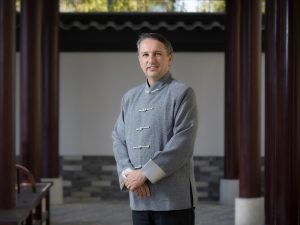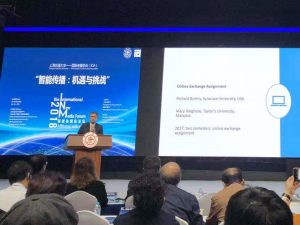Todd Lyle Sandel, an associate professor in the Department of Communication, is an American scholar who speaks fluent Mandarin. He admires traditional Chinese culture and has a deep understanding of the Chinese society and the Chinese ways to communicate. ‘I think of myself as half American and half Chinese,’ he says.
Passionate about Chinese Culture
Prof Sandel once had an interesting phone conversation in which he spoke Mandarin so well that the person at the other end mistook him for a Chinese person. What is more impressive is that he has even learned some Chinese dialects, including Hokkien, Cantonese, and Hakka, in order to better understand Chinese culture, a main subject of his research.
Prof Sandel has travelled extensively in China. It was during a teaching trip in Yunnan province that he developed a deeper appreciation of Chinese culture, thus continuing his journey of studying Chinese culture. He often likes to compare his approach to the approach of his former colleague at the University of Oklahoma named Jonathan Stalling, who is so fond of traditional Chinese culture that he has learned Tai Chi and Chinese poetry. Prof Sandel describes Stalling’s approach as a ‘top-down’ approach, as opposed to his own ‘bottom-up’ approach. According to him, he did not start by learning Chinese poetry, calligraphy, or any other element of traditional Chinese culture. Instead, he learned from farmers, taxi drivers, and labourers.
His initial interest in Chinese culture began more than 30 years ago, when he went to Taiwan to teach English; there he met his wife, Donna. They fell in love and got married. An art teacher, Donna loves traditional calligraphy, painting, and sculpture, and when they lived in the United States, she taught at the University of Oklahoma’s Confucius Institute. ‘I didn’t know at the time that marrying her would change my whole life,’ says Prof Sandel.
Exploring Intercultural Communication
Soon after getting married, Prof Sandel discovered that the worldview of his mother-in-law and other Chinese relatives is very different from his. ‘My mother-in-law was a remarkable woman who worked very hard to raise her children. However, she had no access to education due to political conflicts in Taiwan when she was young,’ he says. ‘Once my wife and I took her to America, she had a hard time dealing with culture shock. She couldn’t understand how the world outside Taiwan runs. There are many women in her generation who are like this.’
Eager to learn more about his mother-in-law and the cultural differences between the US and China, Prof Sandel started learning Chinese and researching on intercultural communication. Initially, he studied family communication and family relations, such as the conflicts between Chinese mothers-in-law and daughters and how Chinese and American parents raise their children differently.
Before joining UM in 2012, Prof Sandel had taught in the US and Taiwan. In 2008, on the sideline of a conference in Hong Kong, he travelled to Macao for the first time, where he joined a historical tour and visited UM. He was fascinated by Macao’s cultural diversity and found out that the city fit his research interests. So when he went back to Taiwan, he told his wife that he wanted to come to Macao.
Studying Chinese Social Media
Prof Sandel’s main research interest used to be family relations, but since joining UM, he has shifted his focus to Chinese social media (especially WeChat and Weibo). He says, ‘The world has changed. When I started studying intercultural communication, there were no social media. There was no WeChat until 2011. But today, social media has become such an important part of our lives.’
In 2018, Prof Sandel and four doctoral students went to Prague, the Czech Republic, to attend the 68th Annual Convention of the International Communication Association. They received a Top Paper Award for their article titled ‘Unpacking and Describing Interaction on Chinese WeChat: A Methodological Approach’, which explores the affordances of WeChat and Chinese as contexts for analysing new forms of interactional data. This paper was subsequently published in the Journal of Pragmatics, a top SSCI journal. It demonstrates how WeChat as a platform, and written Chinese as a script, afford novel and creative forms of communication.
Meanwhile, Prof Sandel also studies the use of Chinese social media in Southeast Asia, such as how Indonesian women use WeChat in for-profit marriages, and why the application is popular in Bhutan. He says, ‘Living in Macao makes it easy for me to reach Southeast Asia for research, which is difficult to do in the US.’
Recently, Prof Sandel is supervising a student dissertation about mainland students in Macao, and in the process he gained a better understanding of the ‘One Country, Two Systems’ policy, its implementation in Macao, and the city’s political system. He says, ‘Had I been on my own, I wouldn’t have been able to fully understand all the articles about Macao, but working together with my students deepened my understanding.’
Source: My UM ISSUE 95




